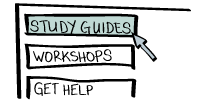 write@uni
write@uniPreparing for successful academic writing
1.8 What's expected of you? Tips from students
At uni you’ll find that some of your lecturers will tell you in detail how to organise and write your assignments, while others may expect you to make some of these decisions by yourself. However, finding out what is expected isn't as complicated as you may think. Listen to the audio clips below to get tips from University of Auckland students.
Check course guides
![]()
|
Download the audio file [0.4 MB] Yi Xin, BSW (Social Work), 1st-year student |
 Show play log
Show play log
Take initiative

|
Download the audio file [0.7 MB] Shuhuan Pan, BCom, 2nd-year student |
 Show play log
Show play log
Get to know yourself
![]()
|
Download the audio file [1.5 MB] Shuhuan Pan, BCom, 2nd-year student Yi Xin, BSW (Social Work), 1st-year student I think the University is awesome because they provide you with so many support services: IT staff at every IT helpdesk, the library is awesome, lots of resources, and then library workshops. And your tutors and lecturers are very well educated and they’ve lots of, they have lots of knowledge, but the key thing would be your awareness of yourself. So you need to be aware of like your, your habits, and what kinds of study strategies get you ticking. And so I would say the crucial thing about success is to be self-aware and that’s actually a very exciting process because you get to know who you are as a person better during this process of like studying and getting into university life. |
 Show play log
Show play log
Ask for advice
![]()
|
Download the audio file [1.1 MB] Yi Xin, BSW (Social Work), 1st-year student Shuhuan Pan, BCom, 2nd-year student |
 Show play log
Show play log
Manage your time
![]()
|
Download the audio file [1.7 MB] Shuhuan Pan, BCom, 2nd-year student Yi Xin, BSW (Social Work), 1st-year student It’s really helpful to get yourself a big calendar where you can have an overview of your weeks from January to June, and then write down, OK, assignment due in April 5th, assignment due on May 12th, and so you are able to see that there are some weeks where there are three assignments concentrated within those two weeks, and then you have a break, and then another three assignments. So in order to avoid the clashes between those assignments, you have to start planning early. |
 Show play log
Show play log
"As a student, you will have to become a kind of anthropologist, reading the culture of your particular class to understand what is said, what is not, and what is intended."
J. Williams and L. McEnerney


